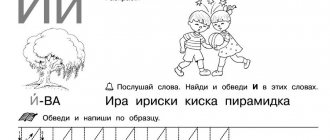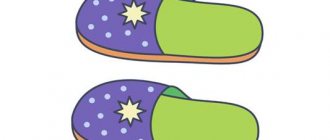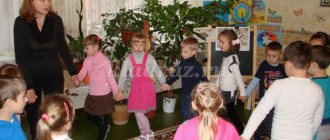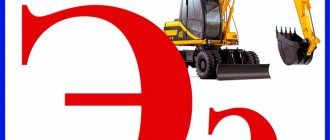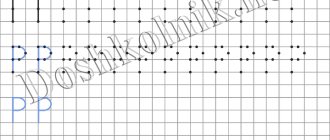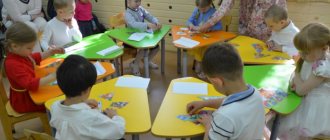Summary of a lesson on speech development in the preparatory group on the topic: “Sound U, letter U”
4. - Guys, now let's pronounce the sound [U] and see what position our lips take? ( lips are drawn out
).
The sound U
is pronounced smoothly, drawn out, the air coming out of the mouth does not meet any obstacles. The sound can be sung freely, which means the sound U is a vowel.
- Is this sound a vowel or a consonant? (vowel)
How did you determine that it is a vowel? Correct, because we can sing it and it does not meet any obstacles.
This sound is always sung
This sound flows like a song.
Sound, fly freely
No obstacles on the way!
-What color will we use to denote this sound? (red)
-Let's remember the sounds we make (hear and pronounce)
-Each sound has its own written sign - a letter. What are we doing? (we see and write).
-The sound U is indicated by the letter U (I show)
-Look at the letter U. How many sticks does it consist of (two).
-Please note that one stick is long and the other is short.
-Guys, look at the board. This is the letter U. Remember, the sound [U] in the letter is indicated by the letter U.
The letter U looks like the ears of a bunny on the top of its head. The snail's horns also look like the letter U.
-Let's write the letter U in the air-
-Let's try to make the letter U
from counting sticks.
- Physical exercise.
Wolves howl at the moon: U-U-UUU (walk stealthily like a wolf)
I sing a sad song: U-U-UUU (imitation of singing into a microphone)
The wind howls strongly: U-U-UUU (we shake our hands like tree branches)
The train is quietly approaching: U-U-UUU (we show the movement of the train with our hands)
I stand and sing in a clear voice (claps in front of me)
Because it is melodious, this vowel U
6.Playing on the carpet
-And now you and I will catch the sound of U with our palms. Clap your hands only when you hear the sound of U - then you will catch it. There is no need to catch other sounds.
U-a-u-i-o-i-u-a-u-o-o
7. Game "One-many" with the ball
- I will name one object, and you will name many objects. (For example: table-tables).
Snail, iron, ear, already, mustache, street, smile, pointer, duck
We go to the tables
8.Game at the tables
-Guys, you have red circles if you hear the sound U
raise the circle.
Words: spider, flower, puddle, varnish, sofa, poppy, table, iron, chair, beetle, goose, already, smile, book, pointer, notebook, ruler, mustache.
9.Work on sheets of paper
-You have pieces of paper with different letters on your tables, but you will have to find the letter “U” among them and circle it!
10. Game “What is not there”
We name all the pictures that hang on the board.
If the sound U is in these words? Now let’s name all the pictures, remember them, and photograph them with our eyes. and now you close your eyes.
-What’s missing? (working on the correct use of singular and plural nouns in the R case)
11. Summing up the lesson.
- Guys, remember what sound we met in class today?
-With what letter?
-What color do we use?
-What did you like most?
- Well done, they studied well, listened carefully, answered questions.
Literature:
2. I am learning sounds and letters. Literacy workbook for children 5 - 7 years old
Makhaneva M.D.
Target.Teach children to analyze a sound series consisting of two vowel sounds; introduce the letter Uy; exercise the ability to navigate the plane of a sheet (directions: top to bottom and bottom to top).
Equipment.
A set of pictures, a plot picture, a panel of letters; sheets of paper with flowers drawn below and paper bees (according to the number of children).
Preliminary work.
Children draw flowers on individual sheets (at the bottom of the sheet).
Progress of the lesson
1. 1. The teacher tells a story, emphasizing the sound [u] in his voice:
- Today I will tell you about a little bee. Her name was Ulya. One early morning Ulya flew out of the hive house. She flew to the meadow beyond the distant forest to collect honey. Ulya hummed cheerfully:
Ooh-ooh, ooh-ooh
I'll collect a lot of honey!
Near the pond, Ulya saw a duck. Mother duck taught ducklings to swim. Ulya flew on. She looks at her friend crawling on a pebble. “Good morning, really!” - “Good morning, Ulya!” The bee flew on, singing:
Ooh-ooh, ooh-ooh
I’ll collect honey for everyone!
2. - What song did Ulya sing? (oo-oo-oo) The bee's song is similar to the sound [u]. Remember the words with the sound [u] from the story about the bee Ulya (if the children cannot remember, the teacher asks leading questions).
- What sound do these words begin with? ([y]). Highlight this sound in words with your voice.
3. Articulation of sound. When pronouncing a sound [y], the lips are in the shape of a tube, the tongue lies behind the lower teeth, the air passes calmly and smoothly, without encountering an obstacle in its path, the sound is pronounced with the voice (the vocal cords vibrate).
Characteristics of sound.
— What do we call sounds that are pronounced with the voice and do not meet obstacles in the mouth? (Vowel sounds) So the sound [y] is a vowel.
II. 1. — While flying through the forest, Ulya heard someone shouting: “Ay!” This girl is lost. Ulya tells her:
Oooh. uh-uh.
Follow me, I'll take you out.
Ulya took the girl out of the dense forest and brought her all the way to the house. The girl had a little brother. The baby cried: “Wa-wa!” The bee left him honey. And she flew on.
The teacher invites the children to remember how the lost girl screamed in the forest (ay) and the crying baby in the crib (wa).
- How many sounds do you hear in a word? (The teacher sings a-a-a-u-u-u, then u-u-u-a-a-a) What is the first sound in a word? What's the second sound? What sounds are these? (Vowels)
Working with the sound house.
2. The teacher suggests remembering and repeating Uli’s songs.
III. 1. Getting to know the image of a letter.
The teacher shows a card with a picture of the letter Uu. The letter moves into the apartment on the letter panel at the address: sixth floor (topmost row), apartment No. 2.
— The letter Uu lives next to the letter Aa. They are neighbors in our house.
2. Analytical and synthetic activities. (Similar to lesson 3)
IV. Exercise “Bee in the meadow” to develop orientation on a sheet of paper and reinforce the direction from top to bottom and bottom to top.
The teacher gives the children their sheets with painted flowers and paper bees.
- Finally, Ulya the bee flew to the meadow. (Children place the bees at the top of the sheet) A bee flies and looks down. So many beautiful flowers. The bee began to sit on the flowers and collect nectar. It will sit on one flower, then rise into the air again. And he sits down again. And it will rise again.
-Where is the bee? (Above) Where do flowers grow? (Below) When a bee lands on a flower, how does it fly? (Top to bottom) And when does it rise from the flower? (Bottom to top) Show how a bee flies.
Children follow the teacher’s instructions, moving the bees along the sheet and accompanying the actions with the appropriate words: top to bottom, bottom to top, etc.
Riddles for children starting with the letter U
Two antennas on the top of her head, And she sits in a hut, She carries it on herself, She crawls very slowly. (Snail)
Horns came out onto the path. You won't butt? I touched them a little, the horns hid again. (Snail)
Along the river, along the water, a string of boats floats. The ship is ahead, leading everyone behind it! (Duck with ducklings)
What is it with Galochka? A thread on a stick, A stick in your hand, And a thread in the river. (Fishing rod)
Amazing child! Just out of diapers, he can swim and dive, like his own mother. (Duckling)
Across the linen country, Along the Sheet River The steamer floats back and forth, And behind it is such a smooth surface - Not a wrinkle can be seen. (Iron)
Progress of the lesson.
Org moment.
2. Main part.
2.1. Introduction to the topic.
Speech therapist: Guess the riddles:
Long and flexible, Hunts for fish, Sometimes it’s empty, like a pipe, But it can’t sing…..(fishing rod).
It strokes everything it touches, and if you touch it, it bites (iron).
Who carries their own house? (snail)
Speech therapist: What is the first sound in the words fishing rod, iron, snail. (Slide No. 1)
2.2. Phonetic exercises.
Speech therapist: What does the sound “U” sound like? (howl of a wolf, whistle of a locomotive).
(Slide No. 2)
a) say after the speech therapist on a smooth, long exhalation:
- the wolf howls: uuuuuuuuu. - the train is moving: uuuuuuuuu...
c) pronounce the sound “U” abruptly on your own
2.3. Clarification of the articulation of the sound “U”.
Speech therapist:
— How do our lips form when we pronounce the sound “U”? (in a tube, the teeth do not close together); (Slide No. 3)
-What sound is that? (vowel). Why? (A voice sings.)
To fix the vocal folds, children place their hand on the neck.
— What color chip will we use to indicate sound? (red)
2.4. Game "Quiet - Loud". (Slide No. 4)
Speech therapist: The wolf howls at the moon loudly, and the wolf cub howls quietly. Boys will be our “wolves”, and girls will be “wolf cubs”. Then we'll switch roles.
2.5. Exercises to develop phonemic awareness. Isolating the sound “U” by ear in the series:
Speech therapist: Clap your hands if you hear the sound “U”.
- vowel sounds: A, U, I, U, A, U, U, A, I;
- words: duck, willow, car, doll, joke, pineapple, letter, pillow, plane, smart, cat, badger, think,...
2.6. Exercises to develop phonemic analysis.
Speech therapist: Look at the pictures, name those where the sound “U” is at the beginning of the word, in the middle of the word. (Slides No. 5,6)
- And now, on the contrary, I name the word, and on your sound lines you mark where the sound “U” is located: in the middle, at the beginning or at the end of the word:
Street, dishes, shoes, coal, boa constrictor, cloud.
Dynamic pause.
Speech therapist: Listen to me and repeat after me the movements:
The planes buzzed. (rotations in front of the chest with arms bent at the elbows.) The planes took off. (Arms to the sides, alternate tilts to the left and right.) They sat quietly in the clearing. And they flew again. (Sit down, hands to knees.)
Continuation of the main part.
4.1. Speech therapist: Select and name only those pictures whose names contain the sound “U”. (Slides No. 7,8)
4.2. Game "Fourth wheel". (Slides No. 9,10)
4.3. Exercise “Complete the picture and color it.”
The speech therapist gives the children colored pencils and a stencil of the “Duck” figurine. (Appendix No. 1)
Summary of the lesson.
Speech therapist: What sound did you learn to pronounce clearly?
— How do our lips form when we pronounce the sound “U”?
Surprise moment. Watch the music video "Wolf". (Slide No. 11)
Assignment: printed letter U for preschoolers
Draw the sticks carefully along the cells with a simple pencil or ballpoint pen.
In cases where the child is asked to write a whole line of a letter, syllable or word, the adult gives a writing sample at the beginning of the line. If a preschooler has difficulties, then an adult can draw two approximate lines, or put reference points that the child will connect with lines, or write the entire letters, and the child will simply circle them in a different color. Calligraphy should not be required at this stage of training.
Print
Presentation: Sound [U]
Terentyeva Natalia Anatolyevna, teacher-speech therapist, State Budgetary Educational Institution Secondary School SP "Kindergarten "Kolosok", Russia, Samara region, Khvorostyansky district, village. Twigwort
- Summary of frontal speech therapy lesson [Sound and letter B]
- Summary of frontal speech therapy session using ICT
- Summary of an individual speech therapy lesson: Sound [L], automation stage
- Summary of a subgroup speech therapy session with 7-year-old children with physical impairment. Topic: “Sound R”
- Summary of frontal speech therapy classes using ICT tools for children 4-5 years old. Theme: "Spring"
( 1 liked, average score: 5.00 out of 5)
Loading...
Tale about the letter U
About a little spider On the shore of a pond in the dill there lived a little, little spider, who was afraid of flies more than anything else in the world. All the beetles, snails, snakes, frogs, ducklings and even the flies themselves laughed at him, and his brothers, the big spiders, scolded him and called him a quitter.
“I need to prove to everyone that I’m not a quitter,” decided the little spider.
And one night he picked a large bouquet of red poppies and painted all the cobwebs in the garden with them.
“The brothers will be happy in the morning,” thought the contented spider, “it’s so beautiful—the red web!”
But alas! The next morning, the evil, despicable big spiders, swearing terribly, washed their webs. The flies immediately noticed the red nets, and none of them were caught.
And the little spider was so scared that it ran far, far away. And now no one knows where he lives...
(G. Yudin)
Poems about the letter U for children
The snail asks the Duck: Throw a fishing rod into the river. The duck threw it in and took out the bleak fish. (G. Satir)
Like a snail before bed, it’s boring in your house! He tries to invent a fairy tale, but it turns out to be a sad fairy tale. (G. Vieru)
Snail-snail, You walk briskly: It will take you four days to crawl from the gate to me. (Ya. Akim)
By the pond, a baby duckling calls out to the mother duck in fear: “Oh, I’m afraid! If a midge bites, help me escape." (F. Bobylev)
In all honesty I will say: I feel bad, I feel bad, I LOVE, I look very disgusting... But I’m not poisonous! (B. Zakhoder)
Amazing people - A bird named hoopoe. Not cut, not combed. A red tuft sticks out above the nose - The whole hairstyle is hanging, Feathers even on the nose. The hairdresser, apparently, does not work in the forest. (A. Pudval)
The bell rang and stopped. The lesson begins. We sat down at our desks together and looked at the board, and quickly opened the Twenty-nine ABC books. We learned the letter A, We learned the letter U. The kids shout UA. We are screaming AU in the forest. From the letter A - watermelon and stork (We tried to remember). Starting with the letter U, guys. An ear, a fishing rod, ducklings... This is what the first grade learned for the first time. (L. Demyanov)
The lion tamer will surprise the students: She tames the lion and the lioness, and is as afraid of mice as she is! (V. Berestov)
The teacher is in my briefcase! Who? It can not be! Really? Take a look, please! He is here. It's called a textbook. (V. Berestov)
The student learned his lessons - His cheeks were stained with ink. (S. Marshak)
At the edge of the forest, two old ladies took milk mushrooms and milk mushrooms. Owl: - Wow! Owl: - Wow! The old women's spirits froze. Creepy! (E. Blaginina)
